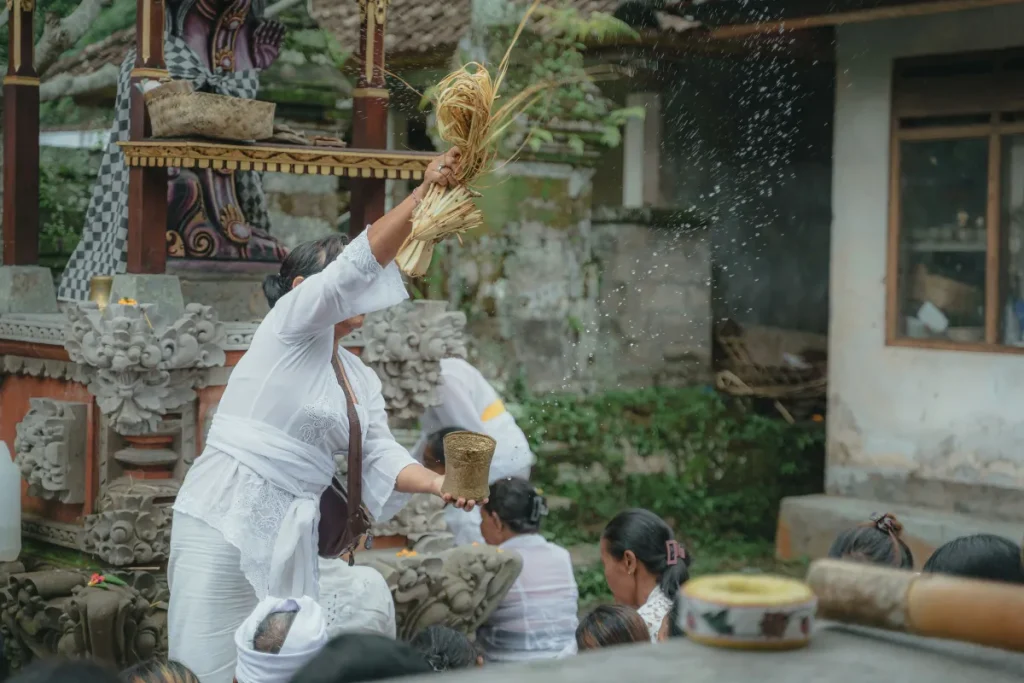Balinese Myths and Taboos: Curses and Culture in Bali
From sacred temples to mysterious taboos, Bali is a land where the mystical meets the everyday. Beyond the beaches and rice terraces lies a deep world of traditional beliefs, ancient superstitions, and spiritual rituals that still influence the way locals live, pray, and even make everyday decisions.
If you’re visiting Bali, understanding these cultural nuances adds a layer of richness to your trip, and might even help you avoid some unintentional bad luck. Let’s explore some of Bali’s most fascinating superstitions, spiritual myths, and traditional taboos.
1. Don’t Point at Sacred Things (Especially with Your Feet)
In Balinese culture, the head is considered the most sacred part of the body, while the feet are the lowest, spiritually and physically. Pointing at someone or something with your feet is a serious sign of disrespect, especially when it comes to temples or offerings.
If you need to gesture, use your right hand because pointing with your left hand is also considered as a sign of disrespect (and even then, do it gently). This is especially important in temples or sacred spaces. Even sitting with your feet pointed at a shrine is considered highly offensive. Most important thing, don’t climb up to the temple or sit down on the temple or sacred statue.
2. The Power of Black Magic and Curses (Leak)
Balinese Hinduism recognizes both positive and negative spiritual forces, and one of the most spine-chilling myths involves the “Leak” (pronounced lay-ak). This is known as a shape-shifting witch who practices dark magic. Stories tell of these beings transforming into floating heads with trailing organs to suck the life out of their victims.
While it might sound like something from a horror movie, belief in leak and black magic is deeply rooted in Balinese villages. Many locals still consult spiritual healers (balian) to remove curses, heal strange illnesses, or ward off negative energy.
3. Never Disturb the Offerings (Canang Sari)
When you are in Bali you will see them everywhere. It’s a small, beautiful offerings made of flowers, rice, and incense, placed on sidewalks, shrines, and even scooter seats. These daily offerings, known as canang sari, are a way to give thanks and keep the balance between good and evil spirits.
Stepping over or carelessly disturbing an offering is considered highly disrespectful. If you see one on the ground, walk around it and never kick it aside, even accidentally. It’s not just a local tradition; it’s a deeply spiritual practice tied to harmony and balance.
4. Babies Are Sacred (and Shouldn’t Touch the Ground)
In Balinese belief, a newborn baby is still closely connected to the divine realm. That’s why babies are not allowed to touch the ground for the first 105 days after birth. During this time, they are carried everywhere by family members, especially mothers and grandparents.
On the 105th day, a sacred ceremony called Nyabutan or Nelu Bulanin is held to symbolically welcome the baby into the human world. It’s a beautiful, emotional ritual that reflects the spiritual importance of birth and purity in Balinese culture.
5. Full Moons and Dark Moons: Rituals and Warnings
In Bali, the lunar calendar is everything. Full moons (Purnama) and new moons (Tilem) are powerful times for ceremonies, offerings, and temple rituals. Locals often wear ceremonial clothing and attend temple events during these days.
At the same time, these phases are believed to be when spiritual energy is strongest for better or worse. Some believe the veil between the physical and spiritual world is thinner during these times, which is why people are more cautious and mindful of their actions.
6. Sacred Architecture and House Layouts
Balinese homes are built with spiritual harmony in mind. Each compound follows a specific layout, designed according to Asta Kosala Kosali, which is similar to Feng Shui. Certain areas are considered sacred and reserved for shrines or family temples, while others are for sleeping or cooking.
Sleeping with your head pointing west (toward the setting sun and spirits of the dead) is avoided, and homes are often guarded by symbolic statues or guardian spirits placed near entrances to keep bad energy away.
7. Be Careful on Nyepi (The Balinese Day of Silence)
Nyepi, Bali’s Hindu New Year, is a day unlike any other. For one day the entire island shuts down. No flights, no traffic, no lights, no noise. Even tourists are expected to stay inside their hotels or villas quietly.
This is more than just a cultural holiday. Balinese silence day is also known as a powerful spiritual reset. Balinese believe that evil spirits roam the island on this day, looking for signs of life. By keeping the island silent and dark, they trick these spirits into thinking Bali is deserted, so they move on. Breaking the silence is not only disrespectful but it’s also considered dangerous from a spiritual point of view.
Read more: Embracing the Silence Day: What to Do During Nyepi Day in Bali
8. Death Ceremonies and Reincarnation
Death is not the end in Balinese culture, it’s part of the soul’s journey. Elaborate cremation ceremonies called Ngaben are held to release the soul so it can reincarnate. These ceremonies can be huge, with processions, gamelan traditional music, and symbolic burning of the body.
Many Balinese believe that souls return to their family lines, and children sometimes show signs or behavior that suggest they’ve been here before. It’s a beautiful belief system rooted in cycles of life, karma, and cosmic balance.
Respecting the Spiritual Side of Bali
While Bali is a tropical paradise on the surface, it’s also an island where spirituality runs deep, and unseen forces are taken seriously. Whether you believe in ghosts, gods, or energy doesn’t matter. Showing respect for local customs and beliefs goes a long way in connecting with the real Bali.
So next time you’re tempted to move an offering, point at a temple, or ignore a local ritual, remember: you’re not just in a tourist destination but, you’re in a living, breathing culture steeped in centuries of sacred tradition.











